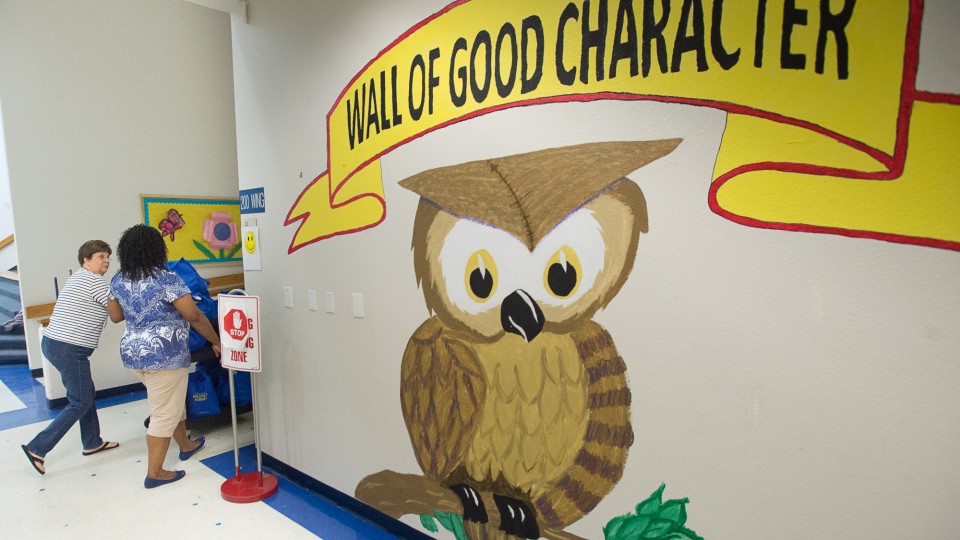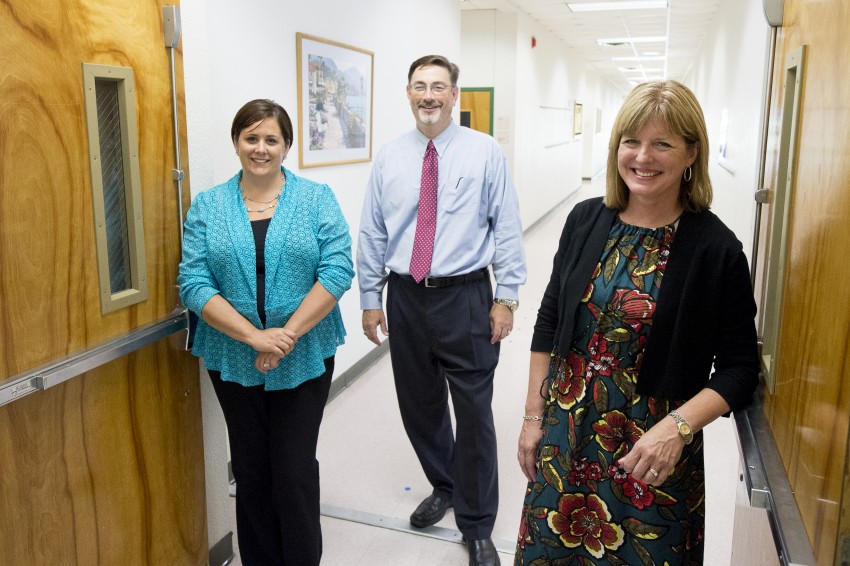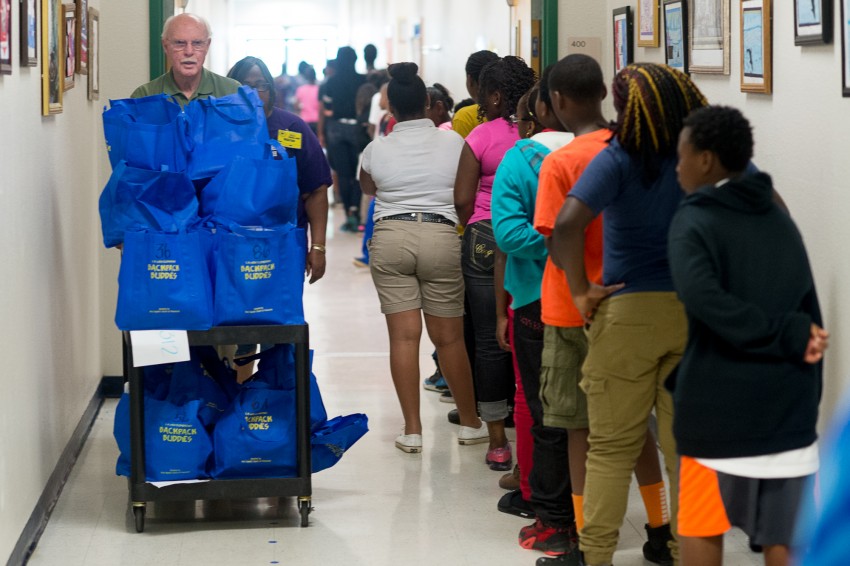Community School offers physical and mental health care
- January 7, 2016
- / Reggie Dogan
- / education

Vanessa Savage and Jennifer Daniel First Baptist Church cordinator for the Backpack Buddies ministry deliver food to students for the weekend at Weis Elementary School.
Research and real-life experience show that students need a wide range of opportunities and support in school to succeed.
C.A. Weis Elementary School, Pensacola’s first community school, aims to remove impediments that can interfere with a child’s educational success from poverty to a lack of health care.
By making C.A. Weis Elementary School the hub of its community and engaging a range of partners with expertise and resources, community schools have shown to support students’ needs and boost their learning.
School officials and Community Schools partners introduced the transformative concept to the Pensacola community on Thursday with a ribbon-cutting ceremony that attracted throngs of people, including community leaders and elected officials.
At their best, community schools recognize that students who are hungry, can’t see the blackboard or are missing school regularly face critical obstacles to learning in the classroom.
As the primary context in which children live and learn, community schools are prime settings for increasing access to mental health care through screening and intervention.
Among the services the Community School will offer immediately is access to mental health care.
Already in place is a behavior center that will provide a healthy alternative for those who need a place let off steam, seek counseling and talk about problems that could hinder their progress in school.
“When kids face trauma, they have a hard time focusing, and a lot of times become angry,” said Diane Born, clinical program director for Children’s Home Society, the primary sponsor for Weis’ Community in School. “With counseling, we hope we can decrease that and put a focus on coping skills. Just being here helps a lot.”
According to the National Institute of Mental Health, one in five children meet criteria for a mental health diagnosis during their lifetime.
For many children, lack of access to mental health care is an extraordinary burden due to barriers, including low socioeconomic status and membership in traditionally underrepresented groups.
It is not a new insight that physical and mental health concerns must be addressed if schools are to function satisfactorily and students are to succeed at school. It has long been acknowledged that a variety of psychosocial and health problems affect learning and performance in profound ways.
Such problems are worsened as children absorb the effects of performing poorly at school and are punished for the misbehavior that is a common cause of school failure.
The community school model puts a premium on mental and physical health, growth and learning, community engagement and safety. The model places site coordinators inside schools to assess students’ needs and provide resources to help them succeed in the classroom and in life.
Partners in the Community School include Children’s Home Society, the University of West Florida, Sacred Heart Hospital, Escambia Community Clinics and Escambia School District Title I representatives.
Malcolm Thomas, superintendent of Escambia schools, envisions a Community School that provides meaningful services that transforms lives and homes in the surrounding community.
"My vision is to see this thing at 8 o'clock at night full of people overcoming obstacles, learning how to dance, from house to house, family to family," Thomas said. "We want to build this so strong that the model will sustain itself no matter who's in charge."
Weis’ location and demographics are perfectly aligned for the services Community Schools provide.
In the school’s ZIP code — 32505 — the median income of the nearly 29,000 residents is $28,489. The Pensacola average is $39,734, according to the U.S. Census Bureau.
All of the of nearly 500 pupils qualify for free- and reduced-price meals.
In 2014, Weis ranked worse than more than 97 percent of elementary schools in Florida and ranked 30th among 33 elementary schools in the district.
Only 14 percent of third-graders last year showed proficiency in math, and 14 percent in reading.
The story of Communities In Schools began in the 1970s, when Founder Bill Milliken, then a youth advocate in New York City, came up with the idea of bringing community resources inside public schools – where they are accessible, coordinated and accountable. A great program simply creates the environment for healthy relationships to form between adults and children. Young people thrive when adults care about them on a one-to-one level, and when they also have a sense of belonging to a caring community.”
And that’s exactly what Community Schools do.
By providing an extra meal, connecting a parent to job training, or enrolling a student in an afterschool program, they can lower barriers to learning and help kids succeed.
Tim Putman, executive director of Children’s Home Society, said the school is looking for a health services coordinator to oversee the centers and make connections with children and their families.

Holly Magee, Principal, Tim Putman and Leigh Ann South at C. A. Weis Elementary School Friday, July 24, 2015. (Michael Spooneybarger/ Studer Community Institute)
A health clinic with two exam rooms is under construction next to the behavior center. A physician and therapist will be available at the school, and a dental van already comes to the school on a regular basis.
In the coming months, afterschool services, including tutoring, arts, music and possibly extended food services, will be available at the school.
Whether it’s food, school supplies, health care, counseling, academic assistance, parental engagement or a positive role model, Community In Schools offer a helping hand.
“We will continue looking to find out what the needs are,” Putman said. “This is our first step with many more to come.”

 CivicCon launches with a look at good growth in cities
CivicCon launches with a look at good growth in cities
 Building stronger brains one baby, one parent at a time
Building stronger brains one baby, one parent at a time
 SCI debuts commercial on Early Learning City
SCI debuts commercial on Early Learning City
 Entrecon: World class speakers and an opportunity to sharpen skills
Entrecon: World class speakers and an opportunity to sharpen skills
 PYP Quality of Life survey 2017
PYP Quality of Life survey 2017
 EntreCon Pensacola 2016: A look back
EntreCon Pensacola 2016: A look back
 Leadership tip: getting better employee takeaways
Leadership tip: getting better employee takeaways
 Leadership tip: be interested instead of interesting
Leadership tip: be interested instead of interesting
 Leadership tip: delivering difficult messages
Leadership tip: delivering difficult messages
 Brain Bags boost Arc, Early Childhood Court programs
Brain Bags boost Arc, Early Childhood Court programs